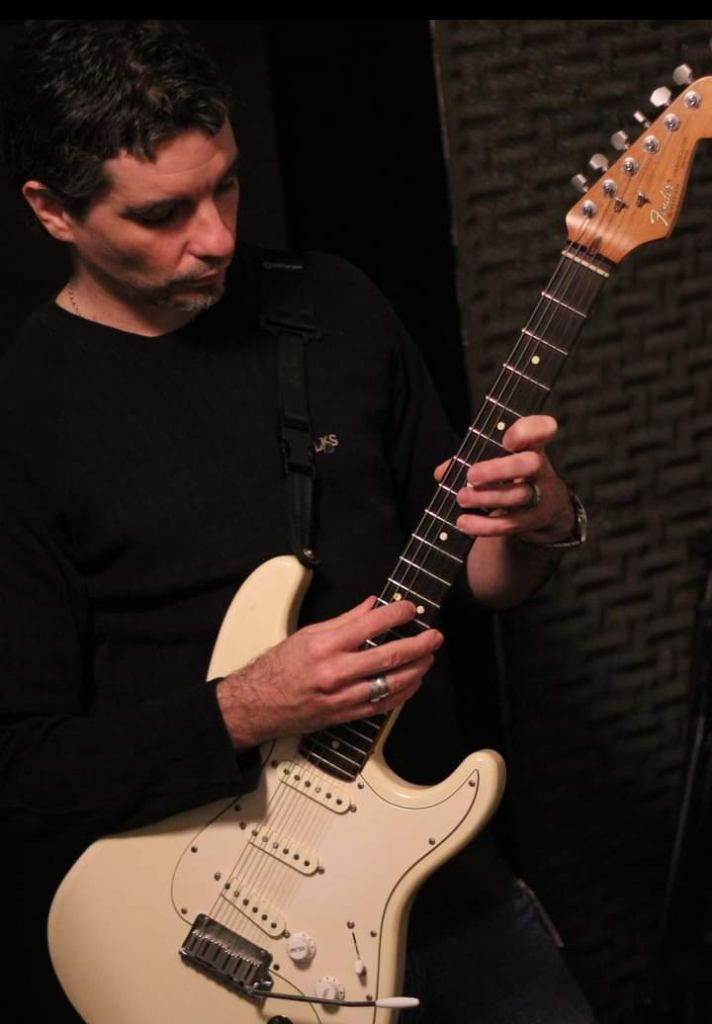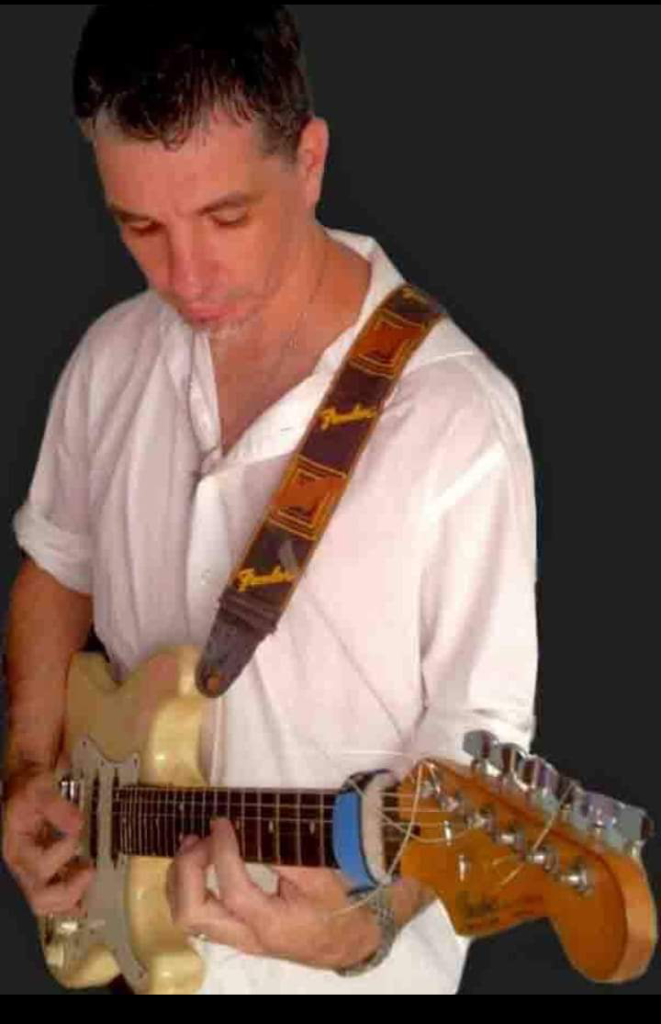By: Rick Landers

Pablo Pescatore
Today, we’re talking with Argentinian guitar instructor, Pablo Pescatore, who pursues his own professional music ambitions while helping novices and advanced players blossom into more proficient musicians.
Born in Buenos Aires, Pablo began his guitar studies when he was 14 years old, focusing on hard rock and neoclassical metal styles. Later, he entered at The Academia E.F.I.M.U.S. (School of the Comprehensive Training of Musicians), a prestigious jazz school for seven years, where he studied classical guitar, music theory, and harmony, graduating with high honors earning a diplomas as a Professor of Guitar, Music Theory and Solfege.
He would play in various bands, run solo at times and broaden his skill set by authoring books, articles and videos and teaching a variety of genre of guitar, including jazz, Bossa Nova, the blues, classical, rock and more.
He’s worked with Mel Bay Publications and other publishing houses with his most recent book, The Complete Book of Shred Guitar, released in 2019. At the moment, Pablo is in the throes of recording a new solo album, and is an endorsee of Skull-String guitar strings.
Guitar International discovers guitar passion in the streets, in local modest venues, as well as in huge stadiums with guitar legends belting out anthemic riffs, far out of proportion to most of our daily lives.
Guitars and guitarists blanket our planet, and it’s important to not only hear about our guitar heroes at Guitar International’s pages, it’s just as valuable to dig into the lives of amazing guitarists here at ground level, where the rubber meets the road between an exceptional local guitarist and their students.
So, let’s see what guitar instructor and guitarist extraordinaire, Pablo Pescatore, has to say about teaching guitar, as well as developing and mastering his own skills on our favorite instrument.
******
Rick Landers: Learning to play guitar tends to be fairly easy, but mastering it seems to be a life-long endeavor. Have you found that you reach plateaus that are tough to work beyond, to reach a higher level of playing?
Pablo Pescatore: Of course, there are technical aspects that are very complex to master and interpret, but with patience and perseverance you can make progress and move forward.
Having an accurate and effective technique is paramount for every guitarist, and is usually the result of disciplined practice and critical listening over the years. But, if technique is not accompanied by solid musical knowledge it won’t do you much good, you’ll just be a guitar player.
If you understand that technique is a tool at the service of music and you dedicate yourself to study, then you will become a musician.

Pablo Pescatore
Rick: What path did you take to study guitar and what kinds of frustrations or challenges did you encounter?
Pablo Pescatore: The first thing I did was to find a private teacher who gave me my first lessons. At the age of 17, I entered the jazz school with the firm conviction of wanting to be a musician and a teacher.
There I found a new world. I began to study harmony, theory and solfège, composition, counterpoint, classical guitar, etcetera. Of course, coming from rock it was a challenge.
When you start studying, the challenges are constant, since you are looking to improve yourself day by day and that’s where frustrations come from, technical exercises don’t work out well, you don’t sound like you want, you don’t understand the theory very well, you get angry and you think about quitting everything.
As the years go by you realize that everything needs time and you should never give up your goals and dreams, even if they seem unattainable.
Rick: Have you figured out any tricks or learning short-cuts that you pass along to your students?
Pablo Pescatore: I use methods and study strategies that make the student achieve in a short time a clear performance on the instrument based on the theoretical knowledge acquired.
It is essential that my students always understand and assimilate what they play, that the rhythmic and harmonic theoretical foundations are not studied in isolation, that they apply them immediately to the instrument.
Rick: What have been some of the most exciting performances you’ve had, as well as some of the strangest gigs you’ve experienced?
Pablo Pescatore: Generally speaking, all the performances were exciting. To be able to rehearse and prepare for a concert is quite an event, really a nice moment. Each performance is a new experience.
Pablo Pescatore: I remember I was about 14 years old when I went to a friend’s house and from his room I heard something very strange. When I went inside I found my friend playing an electric guitar with a super distorted sound, I was absolutely dazzled and shocked, it was clearly a before and after.
I arrived home and the first thing I said: Dad, I want a guitar. My father, with a lot of effort, gave me a studio guitar and soon after I started my first lessons. I was lucky that my parents always supported me and helped me in my student stage.
Rick: What have you learned about yourself with respect to teaching others and have you worked with a younger student who might be considered a child prodigy?
Pablo Pescatore: I have learned that each student is unique and different from the others, that each one has his or her own learning time and that as a teacher, one must be alert to any need. Resolving obstacles quickly to avoid discouragement and stagnation in the student is fundamental.
I have had students with a really incredible level. What you taught them in a class, they learned and applied it automatically. I remember having a classical guitar student to whom I taught works by Carulli, Carcassi, Sor and Tarrega among others, all with sheet music, and it was amazing to see how in the next class he had learned everything.
He got to play technically very complex works. You really realize that this student had an enormous facility for the interpretation and execution of the instrument.
Rick: Tell us about the local music you listened to growing up and how you evolved or developed to become a guitar instructor and performer.
Pablo Pescatore: I always liked music. When I was very young I used to listen to all kinds of music. I loved the Beatles and the warmth of their melodies. Then I got interested in bands like Kiss, Iron Maiden, Scorpions, Metallica, Ac/dc, etc.
But what definitely caught me to develop as a guitarist was the music of Deep Purplee by the hand of the great Richie Blackmore, Rainvow, and the enormous Swedish guitarist Yngwie Malmsteenn.
I became interested in baroque through the music of J.S.Bach, A.Vivaldi and G.Handel, also in classicism and romanticism through Mozart, Haydn, Beethoven, Weber, Paganini and some impressionist musicians.
I love Blues and Jazz especially played on guitar.
As I studied in depth all these musical styles, on the other hand, I continued to acquire musical knowledge in music school. Then, little by little, the technique was intertwined with the study of music, perhaps from that moment I began to forge my facet as a musician and instructor.
Rick: Do you pursue other artistic endeavors or other hobbies that you find bring you satisfaction?
Pablo Pescatore: I love soccer and usually practice it with friends. If I had not been a musician, I probably would have pursued a career as a soccer player.
I enjoy cooking as well as taking care of my plants.
It gives me a lot of satisfaction to make my guitar teaching method books.
Pablo Pescastore: I am not a collector. I would like to have maybe more guitars, but to play them. There is no way I would have guitars just for the sake of accumulating them. I don’t see it wrong with those who do it either, but it’s a personal opinion.
Rick: What projects or plans do you have to develop your performance career or your career as an instructor?
Pablo Pescatore: I am currently working on the edition of my new book Guitar rock extreme for the prestigious Mel bay Publications.
There are several projects already underway, such as the recording of my instrumental album, clinics, tutorials, masterclasses and articles. As for plans, to continue taking and sharing my knowledge to other places, continue editing books, recording and playing. We are also thinking about the idea of creating our own music school.
Rick: What’s the best piece of advice you’ve been given that has helped you become a better musician or instructor?
Pablo Pescatore: The moment I graduated from Jazz school one of my teachers told me; “Pablo, look this is just the beginning.”
At first I was discouraged but then I understood that there is always something new to learn and discover and that makes it even more interesting. You just have to keep on studying…